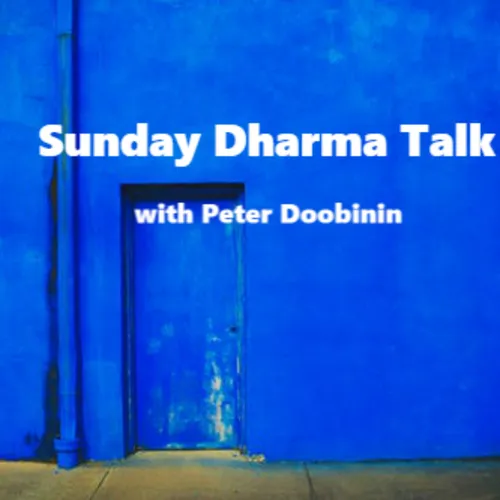
Sunday Dharma Talk
A dharma talk given by Peter Doobinin offered weekly on Sunday.
- Update frequency
- every 7 days
- Average duration
- 37 minutes
- Episodes
- 110
- Years Active
- 2023 - 2025

The Burdens on the Heart
To know a greater happiness, to make the most of our lives, we're asked, as dharma students, to free the heart of its burdens. We're asked in this effort to practice mindfulness of these burdens, th…

Contentedness
What does it mean to know contentedness...? And how do we develop this sublime state of being...? In this dharma talk, Peter Doobinin discusses what it is to be content ... and why it is something …

Strength of Mind
When developed in strength of mind we're able to meet the difficulties and challenges in life; and we're able to make the most of life, to know the joy of living. What does it mean to have strength …

Training the Mind
Meditation is the practice of training the mind. In this talk, Peter Doobinin describes some essential skills for training the mind. Particular attention is paid to working with the "fetters" of re…

The Path of Skillful Resolve
Why, in practicing the dharma, is it important to learn to establish skillful resolve? What does it mean to establish skillful resolve? How do we establish skillful resolve? In this talk Peter Doo…

Freedom from Doubt
As we make an effort to be present, to practice the dharma, we'll encounter doubt. Doubt in ourselves. Doubt in the path. All beings experience doubt; those who are able to move forward on the jou…

A Window of Time
Life is short. If we learn to understand, truly, the brevity of the time we have in this life, we'll be able to make the most of the time we have. In this talk, offered in the winter of 2024, Peter…

Compassion for Thinking
Through wisdom and compassion we're able to abandon habitual patterns of unskillful thinking, our painful narratives. In this talk, Peter Doobinin describes how we develop mindfulness of thinking an…

Faith in the Goodness of Life
There is a goodness in life. But we're often not bringing our awareness to it. In this talk Peter Doobinin explains how we develop faith in the goodness in life, how we learn to know this goodness,…

Compassion & Freedom
Our capacity to know happiness in the this life - true happiness - depends on our ability to open to difficulty, pain, suffering. Meditation practice enables us to meet difficulty ... and to respond…

The Challenge of Compassion
The skillful response to suffering - our own suffering, the suffering of others, the suffering in the world - is compassion. As dharma students, we're asked to cultivate this sublime attitude of the…

Refuge Within
In meeting life, in all its difficulties and challenges, it's essential that we have a place to go for refuge. As dharma students, we find refuge in our communities. And the ultimate refuge is the …

Respect for Concentration
The Buddha encouraged his followers to have "respect for concentration." When we have this respect for concentration, we practice. We develop our meditation. We develop in the Buddha's concentrati…

Consequences of Actions
All beings, the Buddha tells us, have a wish for happiness of heart. And, as the Buddha tells us, our happiness depends on our actions. In this talk, Peter Doobinin describes how we cultivate disce…

Bodhisatta
A bodhisatta is a being who is striving for awakening ... a being who follows the dharma, who practices the dharma in accord with what the Buddha taught. In this dharma talk, Peter Doobinin describe…

A Lot of Love
Life, by its nature, is often difficult. As human beings we're all faced with the inevitable truths of illness, aging, death, separation. And of course there is much in the world that is difficult,…

What is Clinging?
The teachings of the Buddha tells us that dukkha, or suffering, comes from clinging; and that, in turn, if we abandon clinging, we'll know a true happiness in life. But what is clinging? As Peter D…

Two Important Skills
In this dharma talk, Peter Doobinin describes two important skills that we learn to develop in an effort to meet the difficulties in life. The practice of insight meditation is a practice of develop…

Cultivating Skillful Thinking
Our path, in practicing the dharma, includes abandoning unskillful thinking and cultivating skillful thinking. It is essential, as we make our way toward a greater happiness, that we learn to cultiv…

Abandoning Unskillful Thinking
All that we are, the teachings of the Buddha tell us, begins with our thinking. In this talk, Peter Doobinin explains skills we develop in the service of abandoning unskillful thinking. The emphasi…